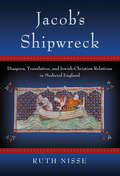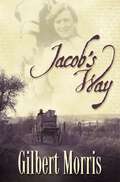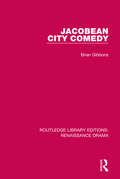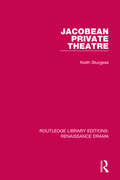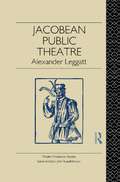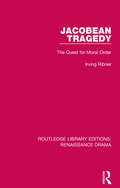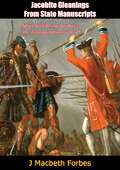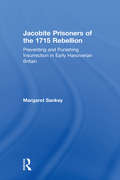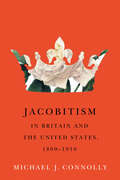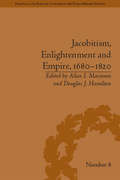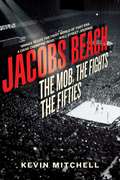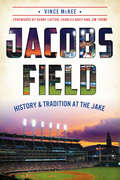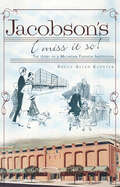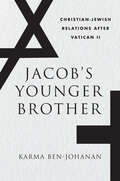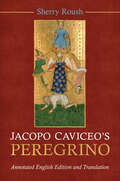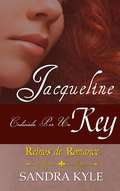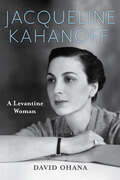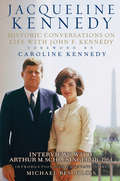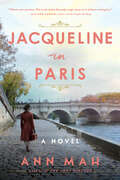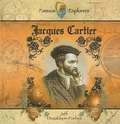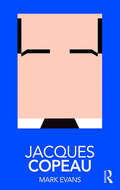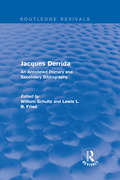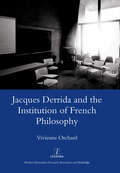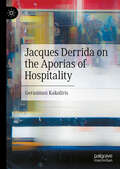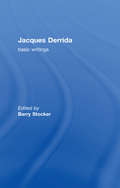- Table View
- List View
Jacob's Shipwreck: Diaspora, Translation, and Jewish-Christian Relations in Medieval England
by Ruth NisseJewish and Christian authors of the High Middle Ages not infrequently came into dialogue or conflict with each other over traditions drawn from ancient writings outside of the bible. Circulating in Latin and Hebrew adaptations and translations, these included the two independent versions of the Testament of Naphtali in which the patriarch has a vision of the Diaspora, a shipwreck that scatters the twelve tribes. The Christian narrative is linear and ends in salvation; the Jewish narrative is circular and pessimistic. For Ruth Nisse, this is an emblematic text that illuminates relationships between interpretation, translation, and survival.In Nisse’s account, extrabiblical literature encompasses not only the historical works of Flavius Josephus but also, in some of the more ingenious medieval Hebrew imaginative texts, Aesop’s fables and the Aeneid. While Christian-Jewish relations in medieval England and Northern France are most often associated with Christian polemics against Judaism and persecutions of Jews in the wake of the Crusades, the period also saw a growing interest in language study and translation in both communities. These noncanonical texts and their afterlives provided Jews and Christians alike with resources of fiction that they used to reconsider boundaries of doctrine and interpretation. Among the works that Nisse takes as exemplary of this intersection are the Book of Yosippon, a tenth-century Hebrew adaptation of Josephus with a wide circulation and influence in the later middle ages, and the second-century romance of Aseneth about the religious conversion of Joseph’s Egyptian wife. Yosippon gave Jews a new discourse of martyrdom in its narrative of the fall of Jerusalem, and at the same time it offered access to the classical historical models being used by their Christian contemporaries. Aseneth provided its new audience of medieval monks with a way to reimagine the troubling consequences of unwilling Jewish converts.
Jacob's Way
by Gilbert Morris"The army makes a man hard sometimes. I remember a young girl no more than ten who gave me a glass of buttermilk just outside of Chancellorsville. I still remember that. I guess that’s all my life is. Some pictures fading out behind me, and there’s not much before me." Reisa listened as he spoke. She knew that he was a man who longed for goodness, and longed for friends, and perhaps even a wife and family. Finally she said, "I hope you find your way, Ben. God is real, and love is real." Fleeing a bloody pogrom that threatens their tiny Russian village, Reisa Dimitri and her grandfather, Jacob, sail the ocean to a new life in America. They are swiftly embraced by New York’s Jewish community. But God has other plans that will call them far from the familiar warmth and ways of their culture. Accompanied by their huge, gentle friend, Dov, Reisa and Jacob set out to make their living as traveling merchants in the post-Civil-War South. There, as new and unexpected friendships unfold, the aged Jacob searches for answers concerning the nature of the Messiah he has spent a lifetime looking and longing for. And there, the beautiful Reisa finds herself strangely drawn to Ben Driver--a man with a checkered past, a painful present, and a deadly enemy who will stop at nothing to destroy him. Fast-paced and tender by turn, Jacob’s Way is a heartwarming novel about human love, divine faithfulness, and the restoration of things that had seemed broken beyond repair.
Jacobean City Comedy (Routledge Library Editions: Renaissance Drama)
by Brian GibbonsThe first decade of the Jacobean age witnessed a sudden profusion of comedies satirizing city life; among these were comedies by Ben Jonson, John Marston and Thomas Middleton, as well as the bulk of the repertory of the newly-established children’s companies at Blackfriars and Paul’s. The playwrights self-consciously forged a new genre which attracted London audiences with its images of folly and vice in Court and City, and hack-writing dramatists were prompt to cash in on a new theatrical fashion. This study, first published in 1980, examines ways in which the Jacobean city comedy reflect on the self-consciousness of audiences and the concern of the dramatists with Jacobean society. This title will be of interest of students of Renaissance Drama, English Literature and Performance.
Jacobean Private Theatre (Routledge Library Editions: Renaissance Drama)
by Keith SturgessIn this scholarly and entertaining book, first published in 1987, the author tells the story of Jacobean private theatre. Most of the best plays written after 1610, including Shakespeare’s late plays such as The Tempest, were written for the new breed of private playhouses – small, roofed and designed for an aristocratic, literary audience, as opposed to the larger, open-air houses such as the Globe and the Red Bull, catering for a popular, ‘lowbrow’ audience. The author discusses the polarisation of taste and the effect it had on literary criticism and theatre history. This title will be of interest to students of English Literature, Drama and Performance.
Jacobean Public Theatre (Theatre Production Studies)
by Alexander LeggattJacobean Public Theatre recovers for the modern reader the acting, production and performance values of the public theatre of Jacobean London. It relates this drama to the popular culutre of the day and concludes with a close study of four important plays, including King Lear, which emerge in an unexpected light as the products of popular tradition.
Jacobean Tragedy: The Quest for Moral Order (Routledge Library Editions: Renaissance Drama)
by Irving RibnerThe work of dramatists such as George Chapman, Thomas Heywood, Cyril Tourneur, John Webster, Thomas Middleton and John Ford can profitably be studied as attempts to construct a new moral order in response to the absence or weakening of the religious sanction. In this study, first published in 1962, the author examines these texts in detail, and throws a great deal of light on the plays as plays. This title will be of interest to students of English Literature, Drama and Performance.
Jacobite Gleanings from State Manuscripts: Short Sketches Of Jacobites; The Transportations In 1745 (classic Reprint)
by J Macbeth ForbesThe Jacobite rising of 1745, also known as the Forty-five Rebellion or simply the '45, was an attempt by Charles Edward Stuart to regain the British throne for his father, James Francis Edward Stuart.Charles launched the rebellion on 19 August 1745 at Glenfinnan in the Scottish Highlands, capturing Edinburgh and winning the Battle of Prestonpans in September. At a council in October, the Scots agreed to invade England after Charles assured them of substantial support from English Jacobites and a simultaneous French landing in Southern England. On that basis, the Jacobite army entered England in early November, reaching Derby on 4 December, where they decided to turn back.Similar discussions had taken place at Carlisle, Preston and Manchester and many felt they had gone too far already. The invasion route had been selected to cross areas considered strongly Jacobite but the promised English support failed to materialise; they were now outnumbered and in danger of having their retreat cut off. The decision was supported by the vast majority but caused an irretrievable split between Charles and his Scots supporters. Despite victory at Falkirk Muir in January 1746, the Battle of Culloden in April ended the Rebellion and significant backing for the Stuart cause. Charles escaped to France, but was unable to win support for another attempt, and died in Rome in 1788.-WikiIn the aftermath of the rebellion the British exacted swift and often brutal revenge for the uprising with confiscations and deportations to the colonies.
Jacobite Prisoners of the 1715 Rebellion: Preventing and Punishing Insurrection in Early Hanoverian Britain
by Margaret SankeyThe Jacobite rebellion of 1715 was a dramatic but ultimately unsuccessful challenge to the new Hanoverian regime in Great Britain. It did, however, reveal serious fault lines in the political foundations of the new regime which enormously restricted the government's freedom of action in the suppression of the rebellion, and effectively made the treatment of the rebels in its aftermath the true test of the new dynasty's legitimacy and stability. Whilst the rulers of England had traditionally dealt harshly with internal rebellion, monarchs and their ministers had to find a delicate balance between showing the power of the regime through the candid exercise of force while maintaining their own reputation for justice and clemency. As such George I and his government had to tailor their reaction to the 1715 rebellion in such a way that it effectively discouraged further participation in Jacobite insurgency, undercut the rebels' ability to challenge the state, and made clear the regime's intention to use a firm hand in preventing rebellion. At the same time it could not cross the line into tyranny with excessive or sadistic executions and had to avoid giving offence to powerful magnates and foreign powers likely to petition for the lives of the captured rebels. To accomplish this feat, the Hanoverian Whig regime used a programme far more subtle and calculated than has generally been appreciated. The scheme it put into effect had three components, to put fear into the rank-and-file of the rebels through a limited programme of execution and transportation, to cripple the Catholic community through imprisonment and property confiscation, and, most crucially, to entertain petitions from members of the elite on behalf of imprisoned rebels. By following such a strategy of retribution tempered with clemency, this book argues that the Hanoverian regime was able to quell the immediate dangers posed by the rebellion, and bring its leaders back into the orbit of the government, beginning the process of reintegrating them back into political mainstream.
Jacobitism in Britain and the United States, 1880–1910 (McGill-Queen's Transatlantic Studies)
by Michael J. ConnollyIn the late nineteenth century a resurgent Jacobite movement emerged in Britain and the United States, highlighting the virtues of the Stuart monarchs in contrast to liberal, democratic, and materialist Victorian Britain and Gilded Age America. Compared with similarly aligned protest movements of the era – socialism, anarchism, nihilism, populism, and progressivism – the rise of Jacobitism receives little attention.Born in the Glorious Revolution of 1688, Jacobitism had been in steep decline since the mid-eighteenth century. But between 1880 and 1910, Jacobite organizations popped up across Britain, then spread to the United States, publishing royalist magazines, organizing public demonstrations, offering Anglo-Catholic masses to fallen Stuart kings, and praying at Stuart statues and tombs. Michael Connolly explains the rise and fall of Anglo-American Jacobitism, places it in context, and reveals its significance as a response to and a driver of the political forces of the period. Understanding the Jacobite movement clarifies Victorian Anglo-American anxiety over liberalism, democracy, industrialization, and emerging modernity. In an age when worries over liberalism are again ascendant, Jacobitism in Britain and the United States, 1880–1910 traces the complex genealogy of this unease.
Jacobitism, Enlightenment and Empire, 1680–1820 (Political and Popular Culture in the Early Modern Period #8)
by Douglas J HamiltonThe essays in this collection examine religion, politics and commerce in Scotland during a time of crisis and turmoil. Contributors look at the effect of the Union on Scottish trade and commerce, the Scottish role in tobacco and sugar plantations, Robert Burns’s early poetry on his planned emigration to Jamaica and Scottish anti-abolitionists.
Jacobs Beach: The Mob, the Fights, the Fifties
by Kevin MitchellThe story of New York in the fifties - of rat pack cool and the fading of the Mob's glamour, brilliantly told through the prism of Madison Square Garden. New York in the Fifties was the most interesting and most vibrant city in the world. New York gave the world a couple of other things too: one bloody and brutal but the king of sports, the other simply bloody and brutal. The Fifties were boxing's last real heyday. Never again would the sport be so glamorous or so popular. And that's where New York's other gift to the world--the Mob--came in. Gangsters have been around for boxing's entire history, but this time it was special. Most of the decade's major fights took place at boxing's spiritual home, Madison Square Garden, and most of the deals that made or ruined the lives of the era's many fine fighters were done on a famous strip of pavement across the road from the Garden: Jacobs Beach. And the man ruling that strip of pavement was a charming Italian murderer called Frankie Carbo.
Jacobs Field: History and Tradition at The Jake (Sports)
by Vince MckeeThe sports landscape changed in the spring of 1994 when the Cleveland Indians moved into their new stadium at the corner of Carnegie and Ontario. No longer the joke of the league, The Jake made them the jewel of baseball and helped revitalize a city and a fan base. For the first time ever, these interviews and stories from the players, managers and front office personnel give the inside scoop on what happened on the field, in the dugout and behind the scenes of this exciting time in Cleveland sports history. Get the best seat in the house for the most recent addition to the Tribe's celebrated legacy.
Jacobson's, I Miss It So!: The Story of a Michigan Fashion Institution (Landmarks)
by Bruce Allen KopytekJoin department store historian Bruce Allen Kopytek in this history of Jacobson's, a beloved Michigan institution for over 100 years. Winner of the Michigan Notable Book Award for 2012.Reenter the marvelous stores and meet the personalities who transformed Jacobson's from its humble Reed City origins to a staple of sophistication throughout Michigan and into the rest of the country. The brainchild of a retail genius, this deluxe specialty store gave customers a peerless social, shopping and dining destination. Experience anew the refined beauty of its Williamsburg-style Grosse Pointe store, the chic designer world of its Birmingham ensemble, or the charm and allure of its original Florida branch in Sarasota, revealing the secrets which made Jake's the dazzling store it was, and why it remains so profoundly missed by anyone who entered through its solid wooden doors.
Jacob’s Younger Brother: Christian-Jewish Relations after Vatican II
by Karma Ben-JohananA revealing account of contemporary tensions between Jews and Christians, playing out beneath the surface of conciliatory interfaith dialogue. A new chapter in Jewish-Christian relations opened in the second half of the twentieth century when the Second Vatican Council exonerated Jews from the accusation of deicide and declared that the Jewish people had never been rejected by God. In a few carefully phrased statements, two millennia of deep hostility were swept into the trash heap of history. But old animosities die hard. While Catholic and Jewish leaders publicly promoted interfaith dialogue, doubts remained behind closed doors. Catholic officials and theologians soon found that changing their attitude toward Jews could threaten the foundations of Christian tradition. For their part, many Jews perceived the new Catholic line as a Church effort to shore up support amid atheist and secular advances. Drawing on extensive research in contemporary rabbinical literature, Karma Ben-Johanan shows that Jewish leaders welcomed the Catholic condemnation of antisemitism but were less enthusiastic about the Church’s sudden urge to claim their friendship. Catholic theologians hoped Vatican II would turn the page on an embarrassing history, hence the assertion that the Church had not reformed but rather had always loved Jews, or at least should have. Orthodox rabbis, in contrast, believed they were finally free to say what they thought of Christianity. Jacob’s Younger Brother pulls back the veil of interfaith dialogue to reveal how Orthodox rabbis and Catholic leaders spoke about each other when outsiders were not in the room. There Ben-Johanan finds Jews reluctant to accept the latest whims of a Church that had unilaterally dictated the terms of Jewish-Christian relations for centuries.
Jacopo Caviceo's Peregrino: Annotated English Edition and Translation (Toronto Italian Studies)
by Sherry RoushJacopo Caviceo’s Peregrino (1508) was a popular Renaissance prose romance in Italy, France, and Spain. Considered the first novel written for women, Peregrino relates the courtship of two young lovers from hostile households who succeed in doing what Romeo and Juliet, among others, could not: reconcile their families and marry without resorting to suicide. Peregrino features cameos of historical celebrities who interact with fictitious characters during their many adventures, which include a Mediterranean pilgrimage, courtly celebrations, funerals, legal trials, and a journey to the Other World. The book presents female agency in psychologically developed characters and contexts and includes allusions to previous literary masterpieces, such as Homer’s epics, Virgil’s Aeneid, and Dante’s Divine Comedy. This edition includes a detailed introduction and a biography of Jacopo Caviceo. Drawing on critical and comparative studies in a broad range of literary interests, the book sheds light on the emergence of the modern novel in the early modern period.
Jacqueline (Reinos de Romance, Libro 1): Cada Dama Tiene Una Historia
by Sandra KyleCada dama tiene una historia. Jacqueline: codiciada por un rey (reina el romance, libro 1) Ambientada en la Francia del siglo XVII durante el reinado de Luis XIV, la historia gira en torno a la heroína infelizmente casada, Jacqueline, y su relación con el rey Luis. Amiga desde hace mucho tiempo de la reina madre, Jacqueline ha sido el centro de los anhelos no expresados y no correspondidos del joven rey. Cuando Louis da a conocer sus intenciones, ¿podrá florecer su romance?
Jacqueline Kahanoff: A Levantine Woman (Perspectives on Israel Studies)
by David OhanaJacqueline Kahanoff: A Levantine Woman is the first intellectual biography of this remarkable Egyptian-Jewish intellectual, whose work has secured her place in literary pantheon as a herald of Levantine, Mediterranean, and transnational culture. Growing up Jewish in cosmopolitan Egypt in the 1920s and 1930s, Jacqueline Kahanoff experienced a bustling Middle East enriched by diverse languages, religions, and peoples who nonetheless were deeply connected to each other through history, business, daily practices, and shared landscape. At the age of twenty-four, Kahanoff immigrated to the United States. Her stories, essays, and short autobiographical novel attest to her penchant to cross boundaries, generations, social classes, sexes, and Western and Eastern constructs. After immigrating to Israel in the early 1950s, she critically addressed the country's "provinciality" and "ethnic nationalism" as seen through her conception of a transnational Levantine culture. Through many writings, Kahanoff set forth her distinctive vision of Israel as a Mediterranean country with a broad, multicultural Levantine identity. Drawing on an extensive array of sources, ranging from interviews with Jacqueline Kahanoff's acquaintances and contemporaries to unpublished writings, David Ohana explores her fascinating life and intellectual journey from Cairo to Tel Aviv. The encompassing vision of a Levantine Israel made Kahanoff the initiator of a different cultural possibility, more extensive than that offered in her time, and also, perhaps, than is offered today.
Jacqueline Kennedy: Historic Conversations on Life with John F. Kennedy
by Caroline KennedyIn 1964, Jacqueline Kennedy recorded seven historic interviews about her life with John F. Kennedy. Now, for the first time, they can be read in this deluxe, illustrated eBook.Shortly after President John F. Kennedy's assassination, with a nation deep in mourning and the world looking on in stunned disbelief, Jacqueline Kennedy found the strength to set aside her own personal grief for the sake of posterity and begin the task of documenting and preserving her husband's legacy. In January of 1964, she and Robert F. Kennedy approved a planned oral-history project that would capture their first-hand accounts of the late President as well as the recollections of those closest to him throughout his extraordinary political career. For the rest of her life, the famously private Jacqueline Kennedy steadfastly refused to discuss her memories of those years, but beginning that March, she fulfilled her obligation to future generations of Americans by sitting down with historian Arthur Schlesinger, Jr., and recording an astonishingly detailed and unvarnished account of her experiences and impressions as the wife and confidante of John F. Kennedy. The tapes of those sessions were then sealed and later deposited in the John F. Kennedy Presidential Library and Museum upon its completion, in accordance with Mrs. Kennedy's wishes.The resulting eight and a half hours of material comprises a unique and compelling record of a tumultuous era, providing fresh insights on the many significant people and events that shaped JFK's presidency but also shedding new light on the man behind the momentous decisions. Here are JFK's unscripted opinions on a host of revealing subjects, including his thoughts and feelings about his brothers Robert and Ted, and his take on world leaders past and present, giving us perhaps the most informed, genuine, and immediate portrait of John Fitzgerald Kennedy we shall ever have. Mrs. Kennedy's urbane perspective, her candor, and her flashes of wit also give us our clearest glimpse into the active mind of a remarkable First Lady.In conjunction with the fiftieth anniversary of President Kennedy's Inauguration, Caroline Kennedy and the Kennedy family are now releasing these beautifully restored recordings on CDs with accompanying transcripts. Introduced and annotated by renowned presidential historian Michael Beschloss, these interviews will add an exciting new dimension to our understanding and appreciation of President Kennedy and his time and make the past come alive through the words and voice of an eloquent eyewitness to history.
Jacqueline in Paris: A Novel
by Ann MahFrom the bestselling author of The Lost Vintage, a rare and dazzling portrait of Jacqueline Bouvier’s college year abroad in postwar Paris, an intimate and electrifying story of love and betrayal, and the coming-of-age of an American icon – before the world knew her as Jackie.In September 1949 Jacqueline Bouvier arrives in postwar Paris to begin her junior year abroad. She’s twenty years old, socially poised but financially precarious, and all too aware of her mother’s expectations that she make a brilliant match. Before relenting to family pressure, she has one year to herself far away from sleepy Vassar College and the rigid social circles of New York, a year to explore and absorb the luminous beauty of the City of Light. Jacqueline is immediately catapulted into an intoxicating new world of champagne and châteaux, art and avant-garde theater, cafés and jazz clubs. She strikes up a romance with a talented young writer who shares her love of literature and passion for culture – even though her mother would think him most unsuitable.But beneath the glitter and rush, France is a fragile place still haunted by the Occupation. Jacqueline lives in a rambling apartment with a widowed countess and her daughters, all of whom suffered as part of the French Resistance just a few years before. In the aftermath of World War II, Paris has become a nest of spies, and suspicion, deception, and betrayal lurk around every corner. Jacqueline is stunned to watch the rise of communism – anathema in America, but an active movement in France – never guessing she is witnessing the beginning of the political environment that will shape the rest of her life—and that of her future husband.Evocative, sensitive, and rich in historic detail, Jacqueline in Paris portrays the origin story of an American icon. Ann Mah brilliantly imagines the intellectual and aesthetic awakening of Jacqueline Bouvier Kennedy Onassis, and illuminates how France would prove to be her one true love, and one of the greatest influences on her life.
Jacques Cartier (Famous Explorers)
by Jeff Donaldson-ForbesBorn in a small fishing town in France, Jacques Cartier became an expert navigator and was chosen by King Francis I to lead an expedition in search of the elusive Northwest Passage. In this beautifully illustrated book, students will follow Cartier as he travels to Newfoundland, New Brunswick, and down the St. Lawrence River to the Iroquois village of Stadacona, which is now known as Quebec.
Jacques Copeau (Routledge Performance Practitioners)
by Mark EvansThis book examines Jacques Copeau, a leading figure in the development of twentieth-century theatre practice, a pioneer in actor-training, physical theatre and ensemble acting, and a key innovator in the movement to de-centralize theatre and culture to the regions. Noe reissued, Jacques Copeau combines: an overview of Copeau's life and work an analysis of his key ideas a detailed commentary of his 1917 production of Moliere's late farce Les Fourberies de Scapin – the opening performance of his influential New York season a series of practical exercises offering an introduction to Copeau's working methods. As a first step towards critical understanding, and as an initial exploration before going on to further, primary research, Routledge Performance Practitioners are unbeatable value for today's student.
Jacques Derrida (Routledge Revivals): An Annotated Primary and Secondary Bibliography
by William R. Schultz Lewis L.B. FriedFirst published in 1992, this book represents the first major attempt to compile a bibliography of Derrida’s work and scholarship about his work. It attempts to be comprehensive rather than selective, listing primary and secondary works from the year of Derrida’s Master’s thesis in 1954 up until 1991, and is extensively annotated. It arranges under article type a huge number of works from scholars across numerous fields — reflecting the interdisciplinary and controversial nature of Deconstruction. The substantial introduction and annotations also make this bibliography, in part, a critical guide and as such will make a highly useful reference tool for those studying his philosophy.
Jacques Derrida and the Institution of French Philosophy
by Vivienne Orchard"Jacques Derrida (1930-2004) was unquestionably one of the most celebrated and reviled French thinkers of the last thirty years. Outside France his influence in comparative literature circles, through deconstruction and other ideas, has been so profound that his personal role as a leader of contemporary French philosophy has been almost overlooked. Perhaps because there is no equivalent in English-speaking countries to the timetabling of philosophy in the French education system, writers on Derrida outside France have not fully appreciated the importance of this political and cultural struggle. In this ground-breaking book, Orchard examines a hard-fought debate of great importance not only to Derrida himself, but also to France's idea of what studying 'philosophy' might mean after the student uprisings of 1968."
Jacques Derrida on the Aporias of Hospitality
by Gerasimos KakolirisThe book systematically presents Derrida’s views on hospitality, as reflected in his texts and lectures from 1995 until his death in October 2004. Derrida’s engagement with hospitality is perhaps the most important and extensive philosophical attempt to respond critically to the growing hostility of many governments worldwide towards specific categories of foreigners, such as refugees and immigrants. Particular emphasis is placed on the ‘aporetic’ nature of hospitality that Derrida describes: namely, that, on the one hand, the provision of hospitality brings us face to face with the hyper-ethical ‘law’ of ‘unconditional hospitality,’ which requires the unconditional reception of the other, i.e. the provision of hospitality to the foreigner without conditions, restrictions or expecting anything in return. On the other hand, the provision of hospitality forces us to face the ‘conditional’ laws of hospitality, which, while establishing a right to and a duty of hospitality, simultaneously restrict hospitality by setting conditions for the arrival and stay of the foreigner. The book also analyses the ‘decision’ and the ‘event’ of hospitality, as well as the unresolved ‘aporia’ at the heart of the ethics of hospitality (or of ethics in general), an aporia or contradiction related to the fact that we cannot be hospitable towards a singularity without ‘sacrificing’ some other singularities. Attention is paid to Derrida’s attempt to open the provision of hospitality beyond humans, that is, to other living beings. Derrida’s views on hospitality are examined in the book in the light of the philosophical thought of Emmanuel Levinas, Immanuel Kant and René Schérer.
Jacques Derrida: Basic Writings
by Barry StockerOne of the most influential and controversial thinkers of the twentieth-century, Jacques Derrida’s ideas on deconstruction have had a lasting impact on philosophy, literature and cultural studies.Jacques Derrida: Basic Writings is the first anthology to present his most important philosophical writings and is an indispensable resource for all students and readers of his work. Barry Stocker’s clear and helpful introductions set each reading in context, making the volume an ideal companion for those coming to Derrida’s writings for the first time. The selections themselves range from his most infamous works including Speech and Phenomena and Writing and Difference to lesser known discussion on aesthetics, ethics and politics.
